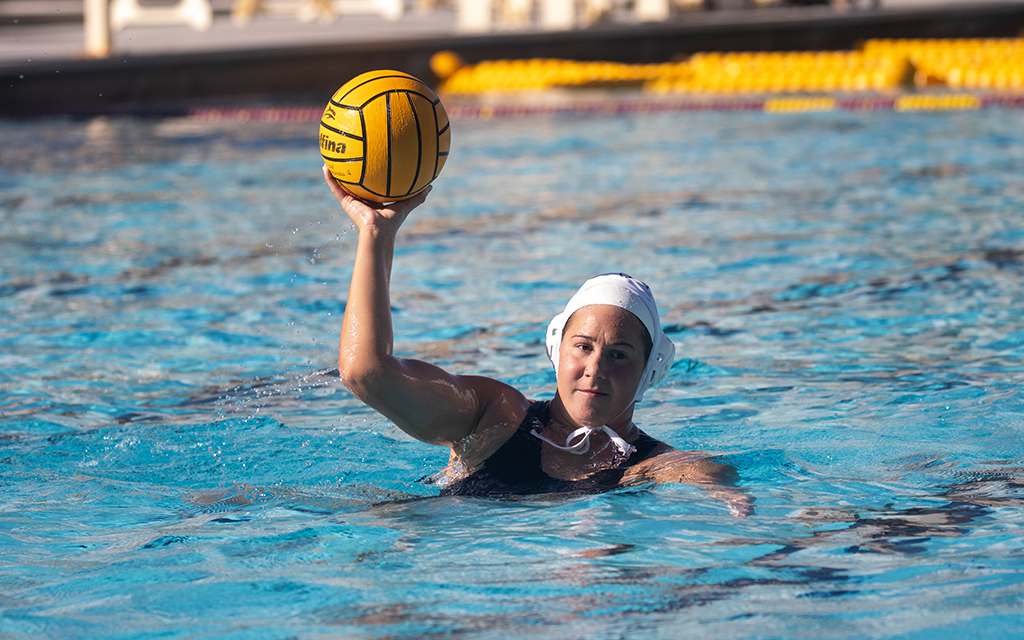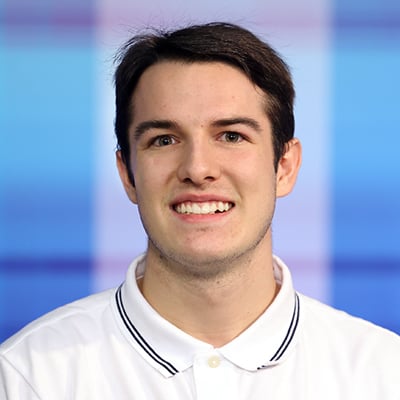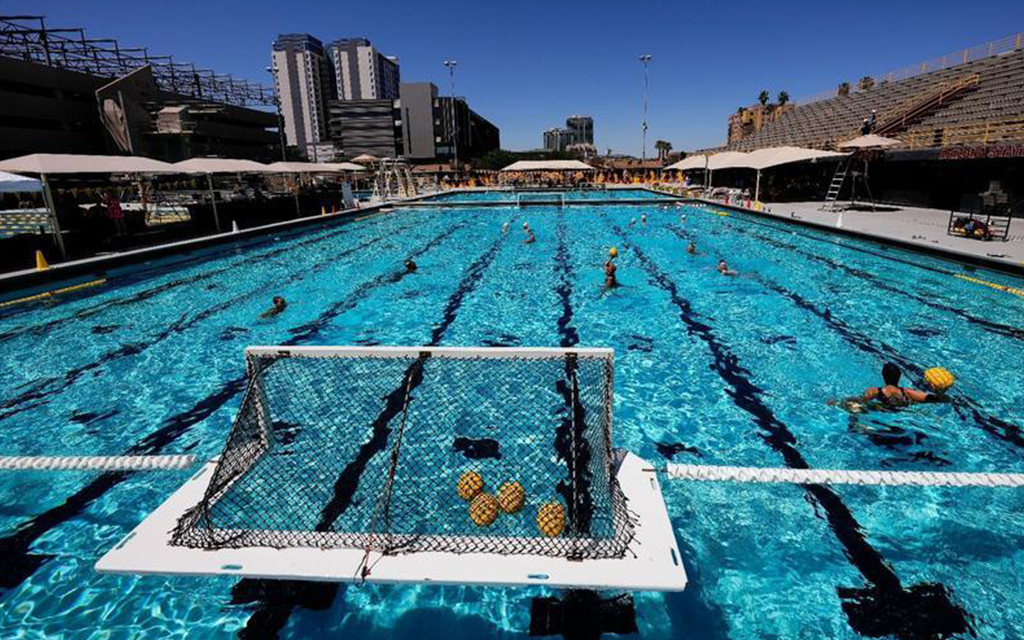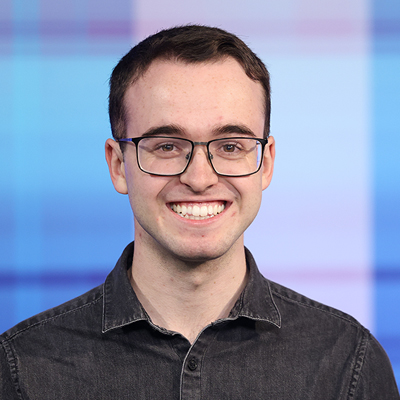TEMPE – From one continent to the next, the Arizona State women’s water polo team is leaping international barriers.
Rostering 10 of 21 players from outside the United States, there is a strong international flavor to the program – and a particular connection with Hungary. ASU coach Petra Pardi, who played for the Sun Devils from 2011-15, is Hungarian. Two Sun Devil players and an assistant coach are also Hungarian.
One of those players, junior attacker Luca Petovary, even played against Pardi’s younger brother in Hungary during her teenage years. The other player, graduate student and defender Lara Kiss, was on ASU’s team when Pardi was still the assistant coach.
The roster is also sprinkled with two players each from the Netherlands, New Zealand, Spain and Canada.
Water polo is not only one of the top sports in Hungary but much of the European continent. The first European Water Polo Championship for men was held in Budapest, the capital of Hungary, in 1926.
The Hungarian women have won the European championship three times, the silver medal five times and the bronze six times.

Arizona State women’s water polo coach Petra Pardi leads a diverse team with players from Hungary and beyond. (Photo by Hayden Cilley/Cronkite News)
The Hungarian women also captured the gold medal at the World Aquatics Championships in 1994 and 2005. Now, the popularity of water polo has spread overseas and is growing in the U.S. In its most recent report, the NCAA found that participation in women’s water polo jumped by 10% from 2020-21 to 2021-22, trailing women’s ice hockey (14%) and fencing (13%) over the same time period.
Even with the increased participation, it wasn’t all sunshine and rainbows for Pardi when she was a player in Tempe. She understands the anxiety that comes with switching cultures, especially while learning a new language.
“The language barrier was pretty unbearable,” Pardi said. “I mean, I had a big personality when I was young, and I was very extroverted. And when I came here, I really wanted to talk to people and meet people and get to know them but my English was so bad.”
Pardi said that much of what others said to her had to be translated back into her Hungarian language before she could give a response in English. Even though adapting cultures was a challenge, it didn’t hinder her prowess in the pool.
Now in her second season as ASU’s coach, Pardi already had made her mark on the program as a player before taking the helm. She sits among the top 10 in the school’s record book for goals scored (157), assists (71) and points (228). After she served as captain of the team as a senior, one chapter closed and another opened when she became a graduate assistant under her former coach, Todd Clapper.
When Pardi transitioned into a job as a full-time assistant coach in 2018, she saw more and more talented Hungarian players make their way to Tempe. In 2020, during the COVID-19 pandemic, Kiss stepped into the Mona Plummer Aquatic Center for the first time as a freshman.
As someone from Hungary, Kiss quickly looked to Pardi for direction amidst the uncertainties of the university and the world at the time.
“She was very patient and she helped a lot at the beginning, like translating and finding your way around campus,” Kiss said. “It is really nice to have someone who you can always count on like that.
“You can talk to her at any time with the language, if you need your native language. I think the biggest part of it is that she is genuinely just so caring of every individual in our team and whether you’re American, whether you’re from New Zealand, or Spain or Netherlands, it doesn’t matter to her because she will help you the same way.”
As the connection between the two grew deeper, in came another player from Hungary. This time, it was Petovary. She experienced many of the same feelings as Kiss and Pardi. So Kiss made sure that she and her teammates lent a helping hand in the transition process.
“When Luca came here, I remember … she didn’t struggle, but the first semester is difficult for everybody,” Kiss said. “So, I was the person who’s, like, helping her a little bit. But I think ultimately, our team is striving to be that community where it’s not just one person’s job to mentor someone through these struggles. It’s everybody’s job to lead. We can lean on each other.”

Arizona State women’s water polo junior attacker Luca Petovary reflects on embracing a new culture and falling in love with Tempe at first sight. (Photo by Hayden Cilley/Cronkite News)
Pardi echoed Kiss’s statement and reflected on the dynamic culture being built through the program. Even with players from the Netherlands, Spain and Canada, the inclusive environment that the players bring is a testament to what Pardi is building in her second season.
“I think we are huge in ‘culture first,’” Pardi said. “Water polo is obviously what we are all here to do because we love it and that binds us together, but water polo is a very small piece of our life and a small piece of our identity.
“Even though the girls love to put a huge emphasis on their athletics here as water polo players, which is incredible and I love that … but they also have to remember that they’re students. They’re also human beings.”
International players face the challenge of leaving friends and loved ones in their countries and starting over in a new environment. With the combination of guidance from her teammates and coaches, Petovary has found a home away from home in Tempe.
She described her introduction to Arizona State as love at first sight.
“As soon as I got here, I had the feeling that I’m going to join a family here,” Petovary said. “I loved the environment. I loved the school. I loved the city immediately when I came here. They took me to really cool places, and I liked the whole vibe. When I came to practice, they really enjoyed being here and I love that vibe. It kind of was like love at first sight.”
Since Petovary and Kiss arrived on campus, they’ve seen an increase in the amount of international players in the sport. After all, 21% of women’s water polo players at the collegiate level are from outside the United States, according to scholarshipstats.com, which compiles and publishes comprehensive statistical information on college athletic scholarships and participation.
Kiss understands that the sport continues to grow outside of her home country, but added that there is more work to be done in other areas of the United States.
“California is like the biggest part of the United States where water polo is very popular and I really wish it grew more and more on the East Coast and Midwest as well,” she said. “As I’ve been here, I can see how it is growing a lot of popularity and a lot of European players come here for school to play here.”
From where the game was when Pardi was a collegiate player to where it is now when she is leading a program, the times have certainly changed.
Still, when asked if there is anything she wished she had known before arriving at ASU as a student and athlete, she shook her head “no.” The former ASU team captain was keen on experiencing a new country, culture and university to push her boundaries and help her grow as an individual.
“I think it’s part of transitioning cultures and transitioning the environment and coming to college, regardless if you’re just coming from the next state over, or coming from overseas,” Pardi said. “It’s a huge time to push your boundaries, to grow as a person.
“And I think every little lesson that you learn along the way will help you shape where you are.”


